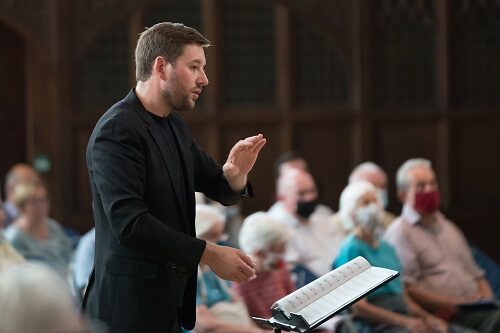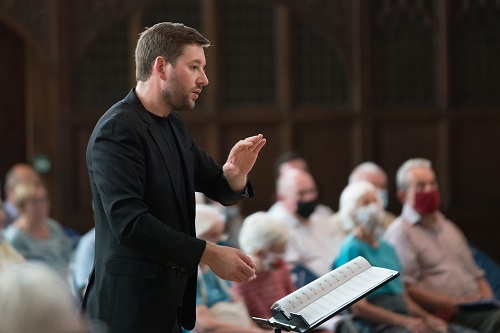
 United Kingdom Three Choirs Festival [3] – Jackson, Tomkins, Howard, Scarlatti: The Marian Consort / Rory McCleery (director). College Hall, Worcester, 26.7.2021. (JQ)
United Kingdom Three Choirs Festival [3] – Jackson, Tomkins, Howard, Scarlatti: The Marian Consort / Rory McCleery (director). College Hall, Worcester, 26.7.2021. (JQ)

Gabriel Jackson – Stabat Mater
Thomas Tomkins – Then David mourned
Dani Howard – Unbound (world premiere)
Domenico Scarlatti – Stabat Mater
This was an afternoon concert to which I had been looking forward ever since it was announced for the 2020 Festival; thank goodness it was possible to rearrange it for this year’s event. I’ve long admired the work of The Marian Consort but so far, I have only been able to experience them on disc. I have heard – and, indeed, reviewed – a good many of the excellent CDs they have made for the Delphian label but this was my first chance to hear them live.
I was especially drawn by the prospect of a live performance of the Stabat Mater by Gabriel Jackson. This was written to mark the Consort’s 10th anniversary in 2018 and even before they had performed it publicly, they made a stunning recording of it (review). The programme didn’t include a list of the singers’ names so I don’t know how many of today’s singers were involved in the recording. Ten voices took part in this performance and I imagine the voice disposition was the same as featured on the disc, namely four sopranos and two each of altos, tenors and basses.
The medieval devotional poem Stabat Mater is attributed to Jacopone da Todi (c.1230-1306). Though it has been set to music, in whole or in part, by many composers, it presents something of a challenge in that it consists of 20 three-line stanzas, so repetition is a potential pitfall. Gabriel Jackson solves this problem expertly by setting each stanza differently, yet he still manages to weave the music into a tightly-knit whole. Opening with a series of arresting homophonic chords, the piece then proceeds to evidence Jackson’s wonderful ear for inventive choral textures, albeit the textures are of necessity, somewhat more austere than one has heard in some of his other choral pieces. The setting is a cappella and must pose formidable challenges of tuning and blend. These challenges were met by The Marian Consort with seeming ease in a wonderful display of disciplined, flawless singing. The piece made a tremendous impact in live performance. Though the entire piece is marvellous, the standout passage for me comes towards the end, beginning at ‘Fac me verum tecum flere’. Here there is an extended and very expressive solo soprano line, gorgeously sung today. As I commented in my review of the CD, this solo line at one and the same time seems to break free from the ensemble yet still remains a part of it. The wok achieves a very satisfying conclusion; the final stanza is set to tranquil music and resolves onto a major chord. The composer was present and I am sure he was delighted with this very distinguished performance.
In a pleasing acknowledgement of Worcester, Rory McCleery and his singers gave us a performance of Then David mourned by Thomas Tomkins (1572-1656). This was a perceptive choice, not just on account of the excellence of the piece itself but also because Tomkins was Organist of Worcester Cathedral from 1596 to 1642. Then David mourned is a setting of a verse from the Second Book of Samuel. Today’s immaculate performance brought out in an ideal fashion the solemn gravitas of Tomkins’ short piece.
Moving right up to the present day The Marian Consort gave the first performance of Unbound by the young British composer, Dani Howard (b.1993). The work was commissioned by the Consort specifically for this concert. From the programme we learned that the initial concept had been to set words depicting the Virgin Mary and the representation of women in history. The title refers to the gruesome habit practised in Asia in the past of binding up the feet of women. Thus, Unbound ‘represents the removal of these bindings and subsequent freedom from old traditions’. I must hasten to say that anyone fearing that the composition would be an angry feminist protest would have been way off the mark. It’s true that the piece did contain one or two short passages of strong music but, for the most part the tone of voice was gentle and any anger at the mistreatment of women in history seemed to me to be delivered as a quiet reproach. The text was assembled from a variety of sources, including ‘The Wife of Bath’s Tale’ from Chaucer’s The Canterbury Tales; the ancient antiphon Ave virgo sanctissima; The Song of Songs; and the writings of Julian of Norwich. Ms Howard wove these texts into a seamless whole.
The performance used eight singers a cappella. As I indicated, a good deal of the music was quite gentle in tone and the colours and textures were consistently pleasing; Ms Howard exploited the voices very well and in a wholly sympathetic way. If I have a criticism, based on a first hearing, I felt that the piece lacked variety of pulse. It’s true that on occasion the music sounded a little faster but this was brought about through shorter note values; watching Rory McCleery conduct, the basic beat seemed to remain fairly constant. For most of the time the music proceeded at a measured pace. Despite that initial reservation, Unbound struck me as an interesting and thoughtful piece which I should like to hear again. The composer was unable to be present – I think Rory McCleery said this was due to Covid quarantine issues – but had she been at the concert I am sure she would have been thrilled with the sensitive and expert premiere of her work.
The concert opened with a setting of the Stabat Mater and it closed with a second setting. This was by Domenico Scarlatti, set in 10 vocal parts with continuo (chamber organ and archlute). I freely confess that this style of music doesn’t greatly appeal to me. However, that personal prejudice did not prevent me from admiring hugely the excellence of today’s performance. Rory McCleery ensured that the textures were kept light and clear throughout. This matters, not least in such passages as the highly contrapuntal setting of ‘Quando corpus morietur’ as the work drew to a close. Throughout the performance, the changes in the mood of the music were nicely conveyed. The Scarlatti was in fact the longest piece on the programme but it didn’t feel that way. That is attributable in part, of course, to the responsive and carefully considered performance; but it is also due to the fact that Scarlatti imbued his setting with precisely that variety of pulse that I had found lacking in the Dani Howard work. This was an admirable way to end the published programme and also to show off the individual and collective virtuosity of the members of The Marian Consort.
Happily, that wasn’t quite the end of the concert. In response to very enthusiastic applause McCleery and his singers treated us to a short encore in the shape of Purcell’s exquisite penitential piece, Remember not, Lord, our offences. Here, the singing was perfectly poised and the grave beauty of Purcell’s writing came out in a performance of beauty and sincerity.
This was a memorable concert. Throughout the afternoon the singing was technically flawless but the performances were about so much more than technical excellence. The singers engaged wonderfully with the words and music and imbued each piece with just the right degree of feeling. Their performances were poised and polished, providing a feast for the ears. And the venue added to the success of the venue. College Hall, adjacent to the Cathedral, is a lovely building with a high wooden vaulted ceiling and stone walls which are partly covered with wood panelling. All this means that the acoustic has an attractive, natural resonance and it imparted a lovely glow to the sound of the Consort.
John Quinn
